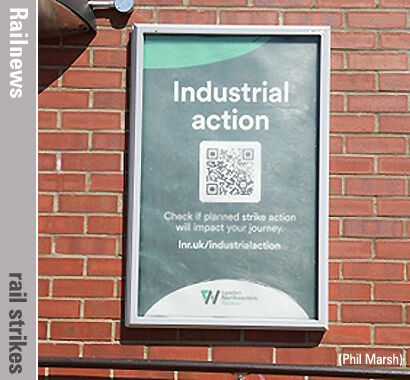Updated 11.10 (Avanti West Coast comment added)
Network Rail and the train operating companies are calling on the RMT to cancel the national strike which has been called for 27 July.
The walkout would be the fourth of its kind in the dispute over pay and jobs, after three strikes were staged on 21, 23 and 25 June.
The RMT has declined an improved offer over two years, which would mean 4 per cent this year, backdated to January, with 2 per cent next year plus a further 2 per cent if Network Rail’s targets for reducing costs by modernising working practices and reducing the size of the maintenance workforce are met. Network Rail is hoping to achieve the reductions by voluntary severance or natural wastage, and has said that any redundant jobs which do not fall into these categories will be replaced by retraining the workers involved for other jobs within the business.
Network Rail chief executive Andrew Haines said: ‘It is incredibly frustrating the RMT has again chosen to disrupt our passengers, and even more so that they haven’t even put what was a fair and affordable two-year pay offer to their members. It is also deeply worrying that these strikes have clearly been designed to disrupt spectators heading to the opening of the Commonwealth Games in Birmingham on 28 July, an event of huge national significance.
‘We have been clear that we can only fund an increase from our own budgets, and the only way we can afford that is by modernising working practices. The RMT’s rejection of our latest offer can only mean they want a pay increase to be funded either by more taxpayer support or higher passenger fares, neither of which we think are fair.
‘We urge the RMT to call this action off, get back round the table with us and show some willingness to compromise.’
If the next strike goes ahead 14 train operators in England will be affected this time, because staff at Govia Thameslink Railway have re-voted, reversing their rejection of strikes in the original ballot. Although ScotRail and Transport for Wales are not involved, rail services in those countries are also likely to be seriously disrupted, because of walkouts by Network Rail signallers.
The Rail Delivery Group has echoed Mr Haines’ remarks, saying: ‘This latest round of action will cause more misery for millions and take money out of the industry at a time when passenger numbers remain 20 per cent below pre-pandemic levels, making it harder to afford a pay increase.
‘We want to give our people a pay raise. But to do that we have bring working practices that are in some cases decades old up to date so that we can adapt to new, more leisure-led travel patterns – including making Sunday part of the standard working week so that services are more reliable at weekends. The alternative is asking taxpayers to shoulder the burden after contributing over £600 per household to keep the railway running during the pandemic, or asking passengers to pay even higher fares when they too are feeling the pinch – and that simply isn’t fair.
‘Instead of staging more counterproductive strikes, we ask the RMT to come back to the table so we can deliver a deal that works for our people, our passengers and for taxpayers.’
Meanwhile, TSSA is also staging a strike of station staff at Avanti West Coast on 27 July. Avanti said it is suspending ticket sales on that day, adding: ‘We’re disappointed with this action by the RMT and TSSA, which we believe is premature, and we are sorry for the inconvenience it will cause.’


